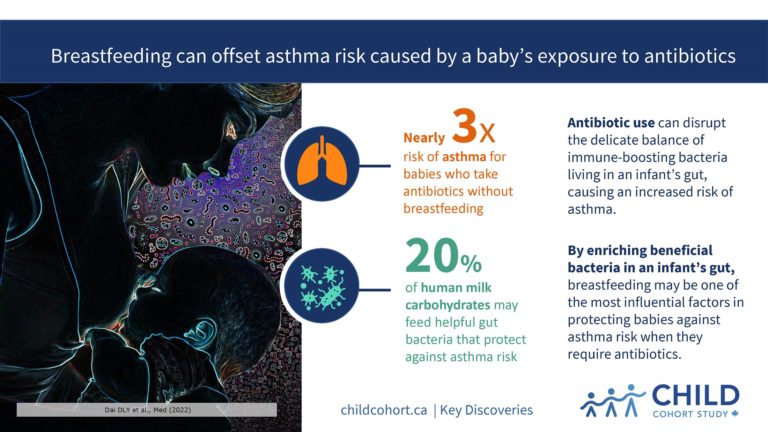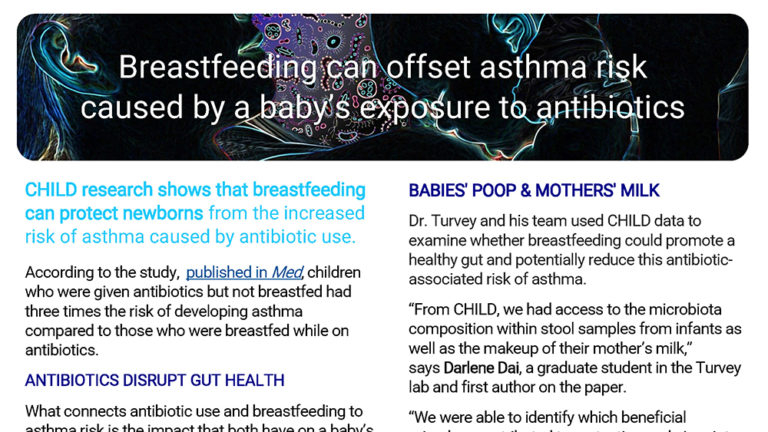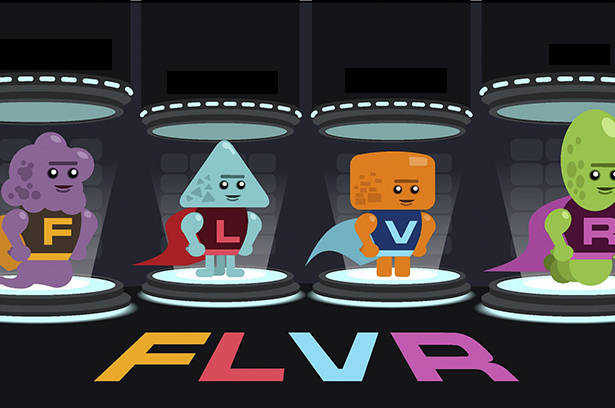Breastfeeding can offset asthma risk caused by a baby’s exposure to antibiotics
CHILD research out of BC Children’s Hospital shows that breastfeeding can protect newborns from the increased risk of asthma caused by antibiotic exposure.
According to the study, published in Med, children who were given antibiotics but not breastfed had three times the risk of developing asthma compared to those who were breastfed while on antibiotics.
Asthma affects around one in seven children globally and is the leading cause of pediatric emergency room visits and missed school days. Suffering from childhood asthma can also lead to lifelong poor lung health.
ANTIBIOTICS DISRUPT GUT HEALTH
What connects antibiotic use and breastfeeding to asthma risk is the impact that both have on a baby’s gut microbiome—the community of bacteria living in the baby’s digestive tract
As past CHILD research helped to establish, in early life the microbiome supports immune development and influences lifelong health, including asthma risk. Past CHILD research has also shown that antibiotic exposure seems to disrupt this delicate microbial balance.
“Increasingly, we have come to understand the enormous influence infant gut health has on overall health,” says Dr. Stuart Turvey, Co-Director of CHILD.
“While strides have been made to reduce unnecessary antibiotic prescriptions, we realize they are still an important treatment for babies when warranted.
“According to our findings, breastfeeding may be one of the most influential factors in protecting these babies when they require antibiotics.”
BABIES’ POOP & MOTHERS’ MILK
Dr. Turvey and his team used CHILD data to examine whether breastfeeding could promote a healthy gut and potentially reduce this antibiotic-associated risk of asthma.
“From CHILD, we had access to the microbiota composition within stool samples from infants as well as the makeup of their mother’s milk,” says Darlene Dai, a graduate student in the Turvey lab and first author on the paper.
“We were able to identify which beneficial microbes contributed to protection and pinpoint the components in the milk that nurture these beneficial microbes.”
MILK FEEDS BENEFICIAL GUT BACTERIA
These components, called human milk oligosaccharides, make up around 20 per cent of carbohydrates in human breast milk and are mostly indigestible by infants. Instead, their main purpose is to support the colonization of beneficial infant bacteria.
Past CHILD research led by Dr. Turvey had already shown the critical role of specific gut bacteria in protecting against asthma, and that reduced antibiotic use results in better gut health and lower asthma risk. CHILD research has also previously shown that breast milk protects against asthma, especially when fed directly from the breast.
One CHILD study specifically highlighted how antibiotic exposure during childbirth negatively affects a baby’s gut microbiome, and how breastfeeding mitigates against this.
This study, however, is the first to show the broader protective effect of breastfeeding against the asthma risk caused by early-life antibiotic exposure.
PROTECTION BY OTHER MEANS
“We realize that breastfeeding is not always an option for infants who have been exposed to antibiotics,” says Dr. Charisse Petersen, a research associate in the Turvey lab and a co-first author on the study.
“We are hopeful that supplementation of the beneficial microbes and the necessary prebiotics identified in the study may be able to provide protection.”





